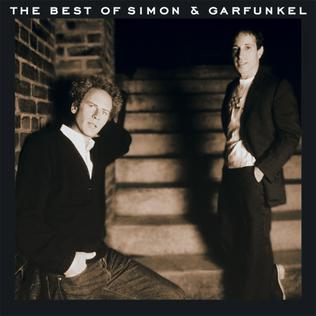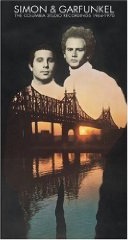
Simon & Garfunkel were an American folk pop and folk rock duo consisting of singer-songwriter Paul Simon and singer Art Garfunkel. One of the best-selling music acts of the 1960s, their most famous recordings include three US number ones: "The Sound of Silence" (1965) and the two Record of the Year Grammy winners "Mrs. Robinson" (1968) and "Bridge over Troubled Water" (1970). Other hits include "The Boxer" (1969), "Cecilia" (1970) and the four 1966 releases "Homeward Bound", "I Am a Rock", "Scarborough Fair/Canticle" and "A Hazy Shade of Winter", as well as the 1968 album track "America".

Simon and Garfunkel's Greatest Hits is the first compilation album from Simon & Garfunkel, which was released on June 14, 1972, two years after Simon & Garfunkel had parted ways.

Paul Frederic Simon is an American singer-songwriter known both for his solo work and his collaboration with Art Garfunkel. He and his school friend Garfunkel, whom he met in 1953, came to prominence in the 1960s as Simon & Garfunkel. Their blend of folk and rock, including hits such as "The Sound of Silence", "Mrs. Robinson", "America" and "The Boxer", served as a soundtrack to the counterculture movement. Their final album, Bridge Over Troubled Water (1970), is among the bestselling of all time.

Live from New York City, 1967 is the second live album by Simon & Garfunkel, recorded at Philharmonic Hall at Lincoln Center in New York City, on 22 January 1967. The album was released on the Columbia Legacy CK 61513 label on 16 July 2002.

"Bridge over Troubled Water" is a song by the American folk rock duo Simon & Garfunkel, released in January 1970 as the second single from their fifth studio album, Bridge over Troubled Water (1970). It was written by Paul Simon and produced by Simon, Art Garfunkel and Roy Halee.

"America" is a song performed by American music duo Simon & Garfunkel, which they included on their fourth studio album, Bookends, in 1968. It was produced by the duo and Roy Halee. The song was later issued as the B-side of the single "For Emily, Whenever I May Find Her " in 1972 to promote the release of the compilation album Simon and Garfunkel's Greatest Hits. After peaking in the charts in July 1972, the song was switched to the A-side of the single and re-entered the charts in November 1972.

Simon & Garfunkel's Old Friends: Live On Stage is the third live album and documentary from their highly successful "Old Friends" reunion concert tour of 2003, with The Everly Brothers as special guests. The "double album" was available as either a 2-CD set or a DVD, separately, or together as a 3-disc package. Both the 2-CD set and DVD were released in December 2004.

"The Boxer" is a song written by Paul Simon and recorded by the American music duo Simon & Garfunkel from their fifth and final studio album, Bridge over Troubled Water (1970). Produced by the duo and Roy Halee, it was released as a standalone single on March 21, 1969, but included on the album nine months later. The song is a folk rock ballad that variously takes the form of a first-person lament as well as a third-person sketch of a boxer. The lyrics are largely autobiographical and partially inspired by the Bible and were written during a time when Simon felt he was being unfairly criticized. The song's lyrics discuss poverty and loneliness. It is particularly known for its plaintive refrain, in which they sing 'lie-la-lie', accompanied by a heavily reverbed snare drum.

The Best of Simon and Garfunkel is the fifth compilation album of greatest hits by Simon & Garfunkel, released by Columbia Records in 1999, containing 20 tracks.

Lawrence William Knechtel was an American keyboard player and bassist who was a member of the Wrecking Crew, a collection of Los Angeles–based session musicians who worked with such renowned artists as Simon & Garfunkel, Duane Eddy, the Beach Boys, the Mamas & the Papas, the Monkees, the Partridge Family, Billy Joel, the Doors, the Byrds, the Grass Roots, Jerry Garcia, and Elvis Presley. He also was a member of the 1970s band Bread.

The Columbia Studio Recordings (1964–1970) is the third box set of Simon & Garfunkel recordings, released in 2001 by Columbia Records. This 5-CD set contains all of their studio albums from 1964 to 1970. The CDs are packaged in miniature recreations of the original LP jackets, and an annotated booklet is also included.

"The 59th Street Bridge Song (Feelin' Groovy)" is a song by folk rock duo Simon & Garfunkel, written by Paul Simon and originally released on their 1966 album Parsley, Sage, Rosemary and Thyme. Cash Box called it a "sparkling, spirited lid".

Old Friends is the second box set of Simon & Garfunkel songs, released in November 1997. The three-disc anthology collects most of the duo's best-known works, and also includes previously unreleased outtakes. Some of these outtakes subsequently appeared on both the reissues of Simon & Garfunkel's five studio albums as well as the later boxed set The Columbia Studio Recordings (1964-1970).

Sounds of Silence is the second studio album by the American folk rock duo Simon & Garfunkel, released on January 17, 1966. The album's title is a slight modification of the title of the duo's first major hit, "The Sound of Silence", which originally was released as "The Sounds of Silence". The song had earlier been released in an acoustic version on the album Wednesday Morning, 3 A.M., and later on the soundtrack to the movie The Graduate. Without the knowledge of Paul Simon or Art Garfunkel, electric guitars, bass and drums were overdubbed under the direction of Columbia Records staff producer Tom Wilson on June 15, 1965. This new version was released as a single in September 1965, and opens the album.

"For Emily, Whenever I May Find Her" is a song written by Paul Simon and recorded by American music duo Simon & Garfunkel on their third studio album, Parsley, Sage, Rosemary and Thyme (1966). It is sung solely by Art Garfunkel, and consists mainly of his vocals with heavy reverb and a 12-string acoustic guitar. The lyrics concern finding a lover, although Simon once characterized the subject matter as being about a "belief," rather than about a specific individual.

Tales from New York: The Very Best of Simon & Garfunkel is a 40-track expanded version of The Best of Simon and Garfunkel compilation album, and the first 2-CD double album of greatest hits by the duo Simon & Garfunkel, released on March 28, 2000.

Bridge over Troubled Water is the fifth and final studio album by the American folk rock duo Simon & Garfunkel, released on January 26, 1970, by Columbia Records. Following the duo's soundtrack for The Graduate, Art Garfunkel took an acting role in the film Catch-22, while Paul Simon worked on the songs, writing all tracks except Felice and Boudleaux Bryant's "Bye Bye Love".

The Definitive Simon and Garfunkel is the fourth compilation album of greatest hits by the folk duo Simon & Garfunkel, released in UK & Europe in 1991.

Bridge over Troubled Water is a 1970 studio album by Paul Desmond. It consists of songs recorded by Simon & Garfunkel and arranged by Don Sebesky.

Simon & Garfunkel: The Complete Albums Collection is the fifth box set of Simon & Garfunkel recordings. This 12-CD Set contains all five of their studio albums from 1964 to 1970, as well as the soundtrack album from The Graduate from 1968, the 1972 Simon and Garfunkel's Greatest Hits compilation album, and four previously released live concert recordings. The CDs are packaged in miniature recreations of the original LP jackets, and an annotated booklet is included.




















